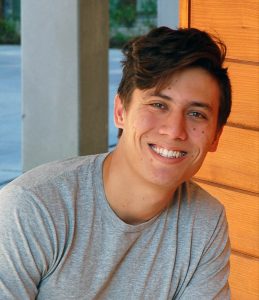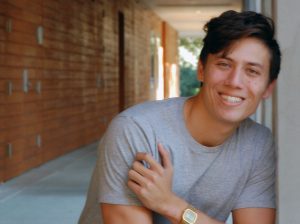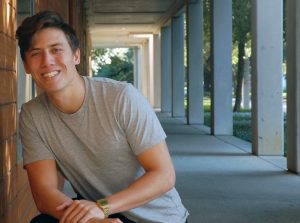 Originally from Houston, CS senior Raymond Cano did not intend to remain in town for college. He was accepted into several competitive programs, but Rice University’s scholarship package and his mother’s influence changed his focus. Then shortly before he packed up for O-Week, he began to experience severe stomach cramps.
Originally from Houston, CS senior Raymond Cano did not intend to remain in town for college. He was accepted into several competitive programs, but Rice University’s scholarship package and his mother’s influence changed his focus. Then shortly before he packed up for O-Week, he began to experience severe stomach cramps.
“Not knowing what I was going to major in, even though I thought it was just a worry in the back of my mind, led to physical manifestations,” he said. ”Both my parents were at work that morning when I woke up with such severe stomach pain that I thought I needed to go to the hospital. So I called a friend to come over and drive me but when they arrived and started talking to me, the pain went away.”
When it happened a second time, Cano reached for his computer as a way to distract his mind from the pain. His symptoms faded as he flipped through photos on his computer. As his classes began, he discovered various coping strategies to deal with what he began to think of as his stress-induced condition. “I realized when I was the happiest, or when I was focused on homework and not the big picture, the pain went away,” he said.
After his Freshman year, he made a commitment to himself to learn how to design and program, so he joined Design for America and he signed up for COMP 140. “Those two things ended up shaping my life at Rice,” he said.
Cano put his stress to rest by enrolling in courses for a degree in chemical engineering and he was hired as a summer intern with Chevron during his first semester of his Sophomore year. He said, “It was a great opportunity, but I really wanted to focus on bio-medical chemical engineering instead of oil and gas.”
Cano took COMP 140 and really enjoyed the approach to problem solving so he signed up for the next introductory course, COMP 182 as well as ELEC 220. His parents wanted him to stick with chemical engineering and just learn computer science (CS) on the side. Like his chemical engineering friends, Cano’s parents expected the Rice degree to lead to a career in the oil and gas industry –not a direction he wanted to pursue.
With one foot in CS and one in Chemical Engineering, Cano began the semester managing 22 hours of classes, trying to fit in the subjects he liked around courses for his declared major. Cano said, “It was crazy bad for my schedule and the stress pain hit again.”
While talking with a friend one night, Cano mentioned his indecision and his intention to drop his CS classes. Cano said, “My friend revealed that he had faced a similar decision a year before and his biggest regret was that he hadn’t changed his major. That was a Friday night and it stuck with me. By the end of the weekend, I knew I’d regret it if I didn’t change my major.”
Rather than dropping his COMP classes, he put his full weight behind them and dropped the other engineering courses. He participated in HackRice, a local hackathon, and found a summer internship at a local technology startup. Still, his stomach pain continued.
At the start of junior year, he enrolled in COMP 215 and 382, plus a statistics class to prepare for a CS course on Machine Learning the next semester. “Machine learning! I had no idea what that even was. You just put some data in the black box and something magically comes out. That semester was one of my hardest. There were lots of nights working until 4 a.m., being unprepared for tests. Even though I’d made the switch to CS, I was suffering from imposter syndrome in a big way.”
Cano was also interviewing for internships and got rejected by the first three employers that interviewed him. He dealt with his ongoing stress-induced stomach cramps by taking deep breaths and thinking about his family, basketball, or music. Cano said, “It was the toughest two weeks of my college career. If I wasn’t working on homework I was in pain.”
That was when he realized he could not compare himself to other students. “You have to evaluate yourself based on where you were last week or six weeks ago,” Cano said.
 He also admitted struggling as minority. This didn’t stem solely from an ethnic makeup, but rather the short, brief background he had in CS. Cano said, “It’s really hard to beat imposter syndrome if you have no previous programming experience, if you are a minority, if you don’t see people in there like you. But my friend Mac Lockard was successful in finding an internship and a job his junior and senior year (Mac had also started pursuing CS his sophomore year). That was very inspiring – to see that it could be done, that you could be successful and even achieve excellence regardless of how late you start, or what your background is.”
He also admitted struggling as minority. This didn’t stem solely from an ethnic makeup, but rather the short, brief background he had in CS. Cano said, “It’s really hard to beat imposter syndrome if you have no previous programming experience, if you are a minority, if you don’t see people in there like you. But my friend Mac Lockard was successful in finding an internship and a job his junior and senior year (Mac had also started pursuing CS his sophomore year). That was very inspiring – to see that it could be done, that you could be successful and even achieve excellence regardless of how late you start, or what your background is.”
While digging through the Center for Career Development’s database for companies coming to the Fall Career Fair, he found something that piqued his interest. “It was for a biomedical tech startup and I had originally come to Rice with a biomed interest. I got in touch with them and we talked three separate times while they were at the career fair.” On that recruiting trip, Bouy Health hired two Rice students: Cano and Andrew Dumit, a statistics major.
Dumit and Cano spent the summer Boston, working with the Bouy Health team to create a digital care assistant. Cano said, “It was a great group of people and felt like family. When you are at a small company, impact isn’t just a buzzword. Andrew and I changed the core algorithms and added core features. It’s no exaggeration to say we had influence on the company.”
Bouy’s collaborative atmosphere also inspired him to try new things. He said, “Brainstorming, problem-solving, user research – we were exposed to everything and always encouraged to take that extra step.”
Back at Rice for his senior year, Cano realized all the programming work he’d done over the summer had increased his confidence. “Now when I have an idea, I can translate it into code,” he said. “It took two and a half years of struggling, running into brick walls, backing up and figuring out what to do next before I finally felt like I was not a complete imposter.”
Cano’s confidence paid off during recruiting season. He received offers from Google as well as six or seven other employers and accepted a position with Plaid, a financial-technology startup.
Looking back, Cano now advises student struggling with imposter syndrome or with any kind of stress to talk to other people. “You don’t realize how many other people go through this kind of pain,” he said. “I never thought I’d be at risk for it. I told my parents, but they didn’t know anything about it. None of us had linked stress to body systems before. Before long, it starts to take a toll on you physically. That’s tough in itself.”
 He credits the Wellness Center with amazing resources and recommends other students look into their services. Cano concluded, “But if you don’t want to go there, talk to your friends. The great thing about Rice is its built-in social structures. Even if you aren’t part of the mainstream in your college, then you are part of the group that isn’t mainstream. Just talk about what you’re experiencing with other people. No one really wants to think or say they are dealing with this anxiety or stress, but it isn’t a weakness. We are in situations where we care and where we want to succeed, and that brings us stress. But you don’t have to deal with it alone.”
He credits the Wellness Center with amazing resources and recommends other students look into their services. Cano concluded, “But if you don’t want to go there, talk to your friends. The great thing about Rice is its built-in social structures. Even if you aren’t part of the mainstream in your college, then you are part of the group that isn’t mainstream. Just talk about what you’re experiencing with other people. No one really wants to think or say they are dealing with this anxiety or stress, but it isn’t a weakness. We are in situations where we care and where we want to succeed, and that brings us stress. But you don’t have to deal with it alone.”
Raymond Cano completed his B.A. in CS in 2017.